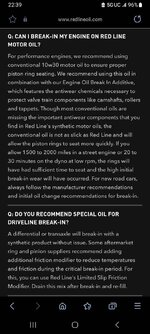There really doesn't need to be a debate. Probably 98% of passenger vehicles either say NOT to change it early or say nothing about early changes. They simply say "change it when the reminder says to". Contrary to popular/wrong belief, automakers don't program their engines to die from oil-related failures a month after the warranty expires. They actually want them to last and if they say changing the oil at 10k miles won't hurt, they'll have data to back this up.
If you want to change your oil at 450 miles, go for it. If you want to change full-synthetic engine oil every 3000 miles, go for it.
I work for a major auto manufactuer, and worked as the lead engine manufacturing engineer for a few years on an engine family currently in production. A couple things:
1. Engine sediment from manufacturing is signficant. I personally have qualified numerous washing machines (blocks, heads, and cranks), and can tell you there is NEVER zero sediment left in the engine from the machining process.
2. Engine sediment from the break in process can be significant.
3. Mating surfaces take time to break in, generate sediment.
4. Factory fill oil is not always the same high quality as recomended in the manual. In the family I worked with, the break in oil was nothing special. (Depends on the engine).
5. Factory fill oil, and oil recomended in the manual is optimized for fuel economy, warranty, cost, and commonization across an engine family or vehicle platform.
That being said, I change my new engine oil at ~500-1000 miles if I plan to keep the car for a long period.


